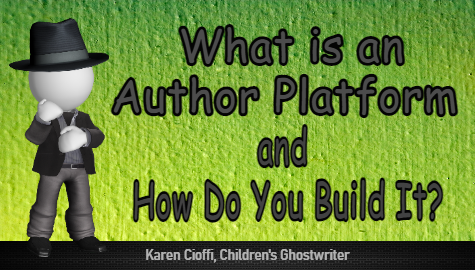Building a writing career can be a long, and at times, difficult road. And, many new authors think writing itself is the tough part, but that’s not really the case.
Writing a story that you intend to publish traditionally or self-publish has a beginning, a middle, and an end. You can create an outline as kind of a GPS to get you from point A to point B. There are steadfast rules and tricks to help you complete your writing journey.
There is an end to that particular writing journey.
With book marketing, that’s not the way it works.
Marketing your book is the roll-up-your-sleeves part of a writing career. It’s the ongoing job of creating and building your online presence, your author platform. And, the rules and tricks of the game are in constant motion, always changing.
While many of the rules may change, there is one constant in your author platform, and that’s visibility.
It should be noted that the definition of an author platform encompasses multiple genres and freelance writers, and even marketers who create and sell information products, so it may vary, depending on who is providing the definition.
But, in regard to your author platform, web editor for the Virginia Quarterly Review Jane Friedman notes that editors and agents are “looking for someone with visibility and authority who has proven reach to a target audience.”
So, the bare-bottom basics of an author platform are: visibility, authority, and proven reach.
Breaking Down the Three Basic Elements of an Author Platform
1. Visibility
This is the promotional aspect of marketing. It’s the element of becoming known in your particular niche and building on that presence.
With online marketing strategies and Google’s updates always on the move, the face of creating visibility has changed. Today, visibility is created through ongoing connections and relationships with your target market, your audience.
It’s also about creating engagement on your blog site and your social networks. This means Likes, Follows, Shares, Retweets, Favorites, and so on.
2. Authority
Authority is built through ongoing communication. As an author you need to provide valuable information to your readers. Providing this information on a regular basis establishes you as an authority in your niche.
Another newer factor in the mix is social proof. Numbers speak and boost your authority.
What’s meant by this is the number of social media followers you have and engagement, your website traffic along with visitor engagement.
3. Your Reach
Elements one and two of your author platform help take care of number three, your reach. By using effective marketing strategies to create an online presence, such as building a website and creating your authority through ongoing information/article marketing, your reach is automatically broadened.
Other strategies you can use to further broaden your reach include:
• Social media marketing
• Blogging regularly on your own site
• Guest blogging
• Joint ventures
• Presenting webinars
• Presenting workshops
• Offering ecourses
Today, your author platform is about what you can offer your audience. It’s about creating content that’s engaging and/or valuable enough for others to share. It’s not about what you’re selling.
Providing ongoing ‘wanted or needed’ information builds a relationship. In the marketing arena a general rule of thumb was to offer 80 percent free, valuable information and 20 percent promotion. Now, it’s recommended to offer 90 percent free, valuable information and 10 percent promotion.
It’s this ongoing author/reader relationship that will build your author platform and help sell your books, other products, and services.
Reference:
http://janefriedman.com/2012/03/13/author-platform-definition/
 Being a writer, like being any kind of artist who creates something from nothing, is an amazing ability. It’s almost like magic. And, you are in control. You decide what to create. The only limit you have is the cap on your imagination.
Being a writer, like being any kind of artist who creates something from nothing, is an amazing ability. It’s almost like magic. And, you are in control. You decide what to create. The only limit you have is the cap on your imagination.
Check out my 250+ page ebook (or paperback) that gives you all the basics of HOW TO WRITE A CHILDREN’S FICTION BOOK. It’s newly revised and includes information on finding a publisher or agent, and marketing your books.
Small Home-Grown Book Publishers – Good or Bad?
Writing Success – Commit to It
Traditional Publishing and Self-Publishing – The Differences



1 thought on “What is an Author Platform and How Do You Build It?”